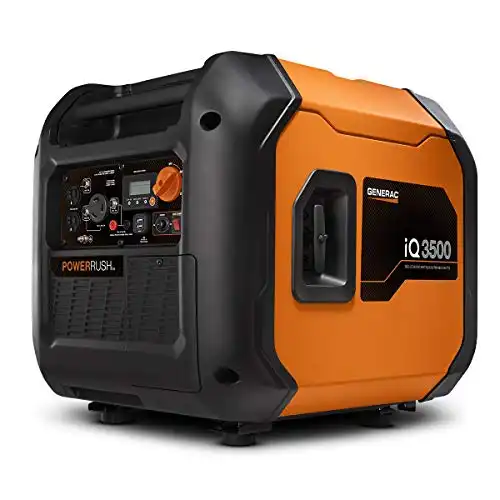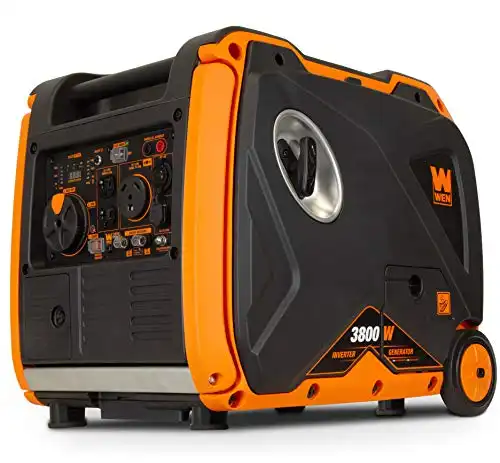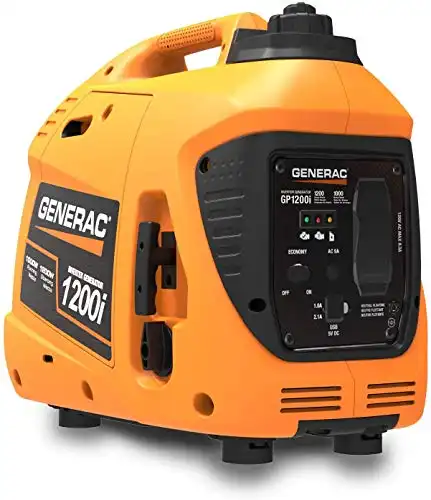If you own an RV, the chances are that you have thought about purchasing a portable RV generator for times when you don’t have access to shore power. Generators have seen many innovations over the years, have become much more affordable, and are available from dozens of manufacturers. As a result, many generators on the market today are very quiet, compact, and can run for extended periods with less fuel.
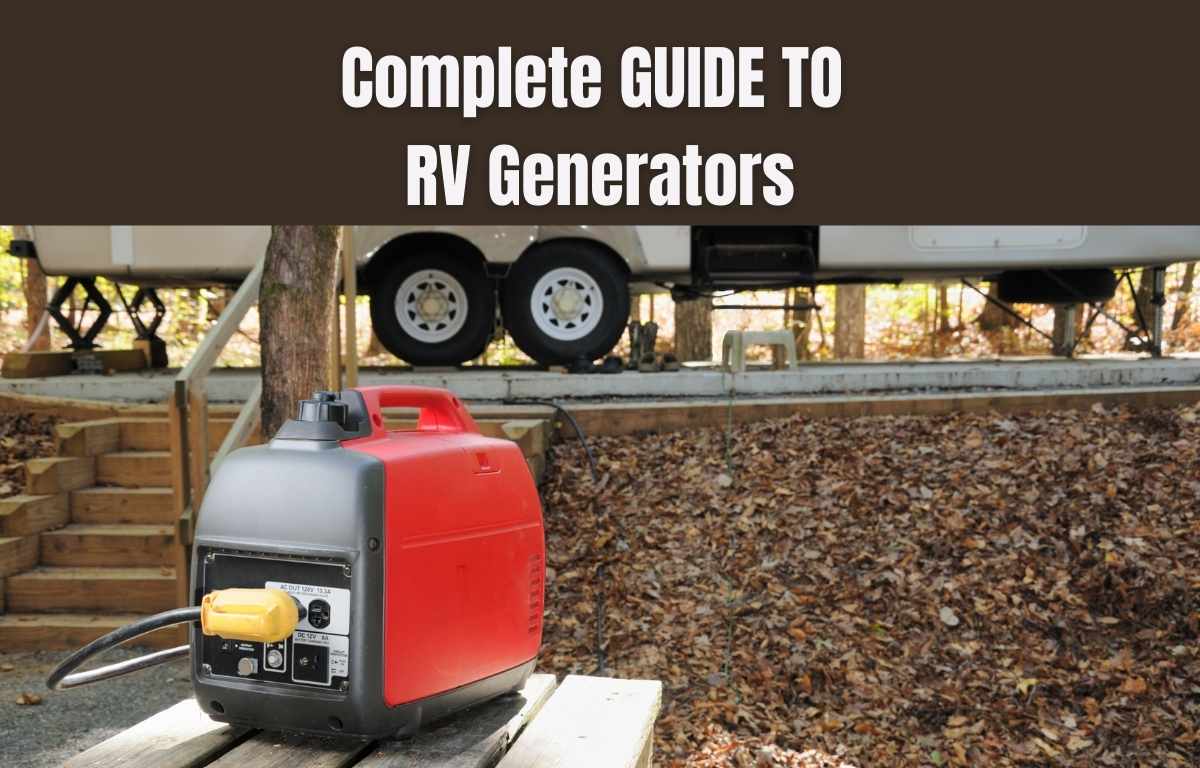
Choosing the right generator involves identifying your specific needs for power, determining how quiet you want it to be, and considering the price of the unit for your budget. However, with so many great models on the market, making the right decisions isn’t too difficult.
I have been using portable generators for over 20 years, and if there is one piece of advice I suggest for RV owners, it is to purchase an inverter generator that is compact and quiet. For most RVers, a generator between 2,500 watts and 3,500 watts is the sweet spot for most RV setups.
Here are some quick picks for my favorite ones on the market today:
|
Primary Rating:
3.5
|
Primary Rating:
3.5
|
Primary Rating:
3.5
|
Primary Rating:
3.5
|
|
$992.24
|
$1,199.00
|
$798.95
|
|
Types of generators
There are two types of generators that you’ll find at your local stores: Open frame conventional generators and inverter generators. While I’ll briefly describe the differences between the two, if you’re purchasing a generator for your RV, you’ll most likely be interested in an inverter generator.
Understanding the difference between the two types of generators is important. A generator converts mechanical energy into electrical power. Portable generators use an engine, like your car, to produce the electrical current, turning it into AC (alternating current) used in household electronics.
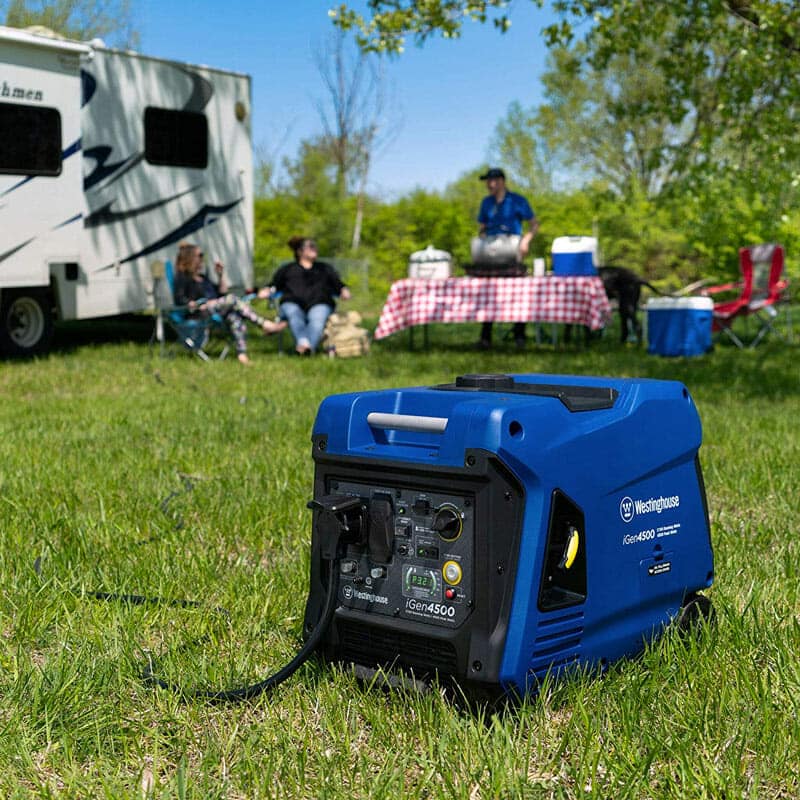
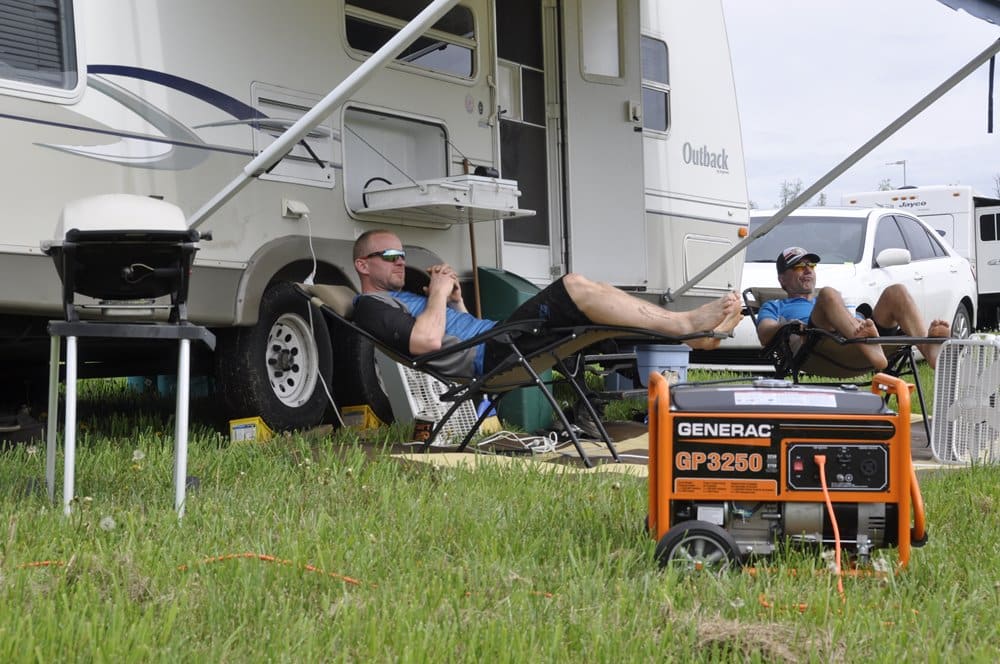
A conventional fuel-powered portable generator runs at 3600 rpm to generate 120 volts and a frequency of 60 Hertz. It’s the speed of the engine that creates the electricity supply. Since engines can fluctuate slightly, their energy is not always steady electricity or clean. The fluctuations are referred to as harmonic distortion.
This distortion isn’t a problem for many electricity needs when powering mechanical devices. For example, these generators are often used on construction sites to power heavy power tools. They work fine off of this type of electricity. However, in the last few decades, more and more devices have integrated electronics that prefer clean, steady energy. We’ll call them sensitive electronics. Things like computers, cell phones, TVs, streaming boxes, etc., all have sensitive electricity needs. For this reason, traditional generators aren’t always the best choice. Your electrical needs in your RV likely have many items that fall into this category.
While these devices will often still work off of non-clean electricity, you create more risk for them to fail. Eventually, a power surge can cause them to fail. This reason is why inverter generators have become so popular, among other reasons.
An inverter generator involves a few extra steps when producing electricity. While it will initially operate similarly to a conventional generator, it adds a few more phases to produce clean, steady electricity. It will initially create a high-frequency AC, turn it into DC electricity, and then back to a stable AC. This conversion from DC back to AC allows it to produce a steady stream of constant power.
Why choose an Inverter Generator?
Aside from the clean power benefit, inverter generators have many more great features that make them perfect for camping and RV travel. Below are the key benefits that you’ll get with many portable inverter generators.
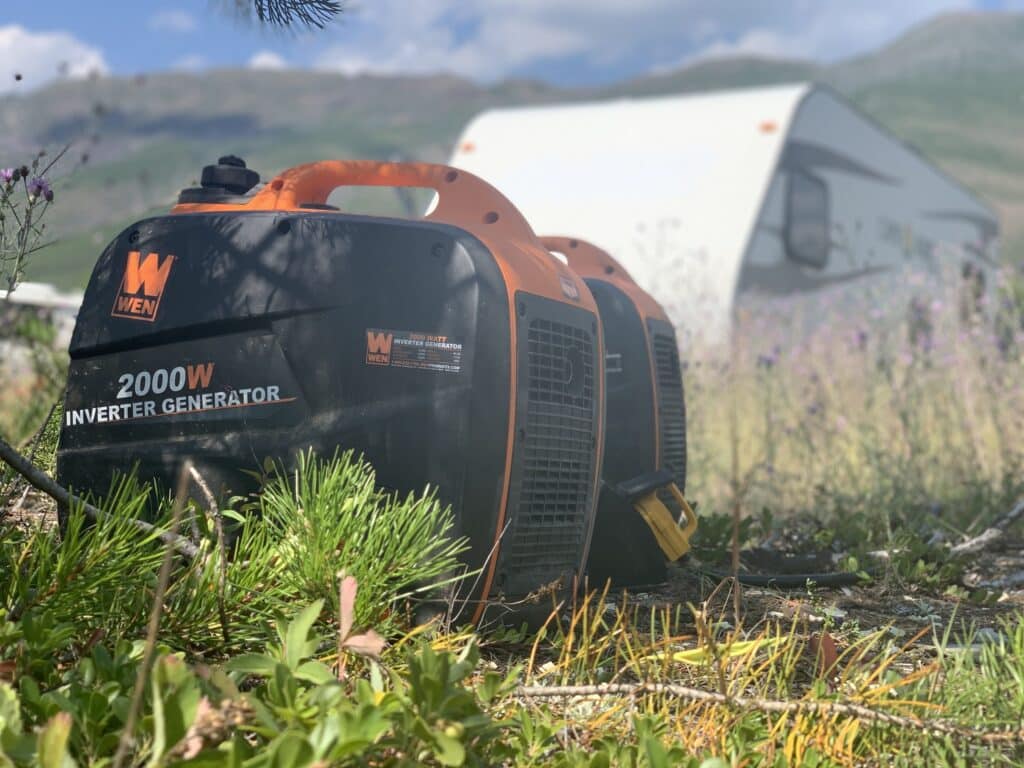
Fuel Efficiency
Inverter generators are much more energy efficient because of the way they produce electricity. In an inverter generator, the engine automatically adjusts to the requested load on the generator. Unlike conventional generators, which produce their full power all the time, inverter generators will throttle up and down depending on the amount of electricity you need.
For instance, let’s say you have your generator connected to your RV and are running the refrigerator, air conditioner, lights, and TV. Depending on the size of your generator, it may be running at maximum speed. Next, let’s say you turn off your air conditioner, significantly reducing power consumption. Your inverter generator will throttle down and run slower, outputting less electricity. This fluctuation results in lower fuel demand and will improve efficiency.
Many inverter generators also off an eco-mode, which keeps the generator running at the lowest setting possible. With a conventional generator, you may get 3 hours or so per gallon of gas of runtime; however, with an inverter generator, you may get 8-12 hours per gallon of gas for the same electricity use.
Fuel savings is one of the best features of inverter generators. Across the board, they will be much more efficient. This fuel-saving feature is an excellent benefit for folks using them for extended periods while camping. For a typical weekend camping trip, a 5-gallon container of gas may be more than enough to give you all of the electricity that you need.
Portability
Conventional fuel-powered generators, which produce more power, have a larger fuel tank and engine, inevitably making them heavier and larger. However, inverter generators are more portable because their fuel tank is smaller, and they don’t need as big an engine to run. This difference significantly reduces a lot of weight and size of the generator. In addition, while many conventional generators must be moved around on wheels, many inverter generators are often light enough to be hand-carried with a handle. As a result, most inverter generators weigh less than 100 pounds. However, it is common for an inverter generator only to weigh around 40 – 60 pounds.
Noise:
The most noticeable benefit of inverter generators is the noise or lack thereof. If you’re familiar with conventional generators, you know they’re loud. Just drive through any town during a power outage, and you’ll likely hear the rumbling of generator engines echoing in the distance. On the other hand, inverter generators are quiet, which is ideal for camping situations.
Inverter generators are significantly quieter for several reasons. First, as described above, they can throttle down when the electricity demand is low. When camping, most electric equipment you use won’t require a lot of power when running. Your biggest energy hogs, like air conditioners, will require a lot of power to start, but when running, they don’t need nearly as much to stay running (more on this later). As a result, you can use most of the electrical components of your RV with relatively low power demand. Your generator will adjust to this and run slower, making it quieter.
Think of your car noise when idling vs. accelerating. A conventional generator engine would run at the acceleration speed all the time. The inverter generator would ramp up when needed but fall back to the much quieter idle speed when demand is low.
The second feature that makes inverter generators quieter is their design and engineering. For example, they’re enclosed in a noise-dampening shell rather than the engine being open in a frame like conventional generators.
Better-designed inverter generators will offer better noise shielding than conventional ones. Even the cheapest inverter generator will be quieter. This difference is good news for you and your camping neighbors. Some inverter generators are no louder than a window air conditioner,
Parallel Connections
Since inverter generators usually produce less electricity than conventional generators (wattage), many manufacturers try to compensate for this by installing a parallel connection. With a parallel connection, you can connect two separate inverter generators (of the same model) to deliver double the amount of power.
Emissions
Each state has its own regulations on the accepted greenhouse gas emissions of generators. These regulations can be stricter when the portable generator is used inside national parks or nature reserves.
In most cases, a portable generator must be at least EPA-compliant. In the state of California, the generator must also be CARB compliant.
Inverter generators already produce fewer greenhouse emissions than conventional power-fueled generators. Therefore, it is easier to find an inverter generator that meets the environmental requirements than a traditional generator.
Choosing the right Inverter generator
Now that you know all the benefits of an inverter generator, how do you choose the right one to purchase? You not only need to think about the brand but, more importantly, about your power need or generator size.
Since almost all generators will advertise their size by watts, you can start to think about your power needs according to this number.
What are watts?
The first thing to know is that watts are the product of voltage times amps, typically expressed as: (watts = amps X volts). Therefore, if you know an appliance’s operating voltage and amp draw, you can determine watts. For example, many of your electric needs in your RV will be 120V appliances (pretty much anything you plug into a standard outlet). Knowing this, you can multiply the amps of a device by 120 to get the watts. However, some of your appliances will run on 12V DC since you are in an RV. For example, your RV furnace may have an amperage draw of 7 amps, giving you 12V x 7amps=84 watts.
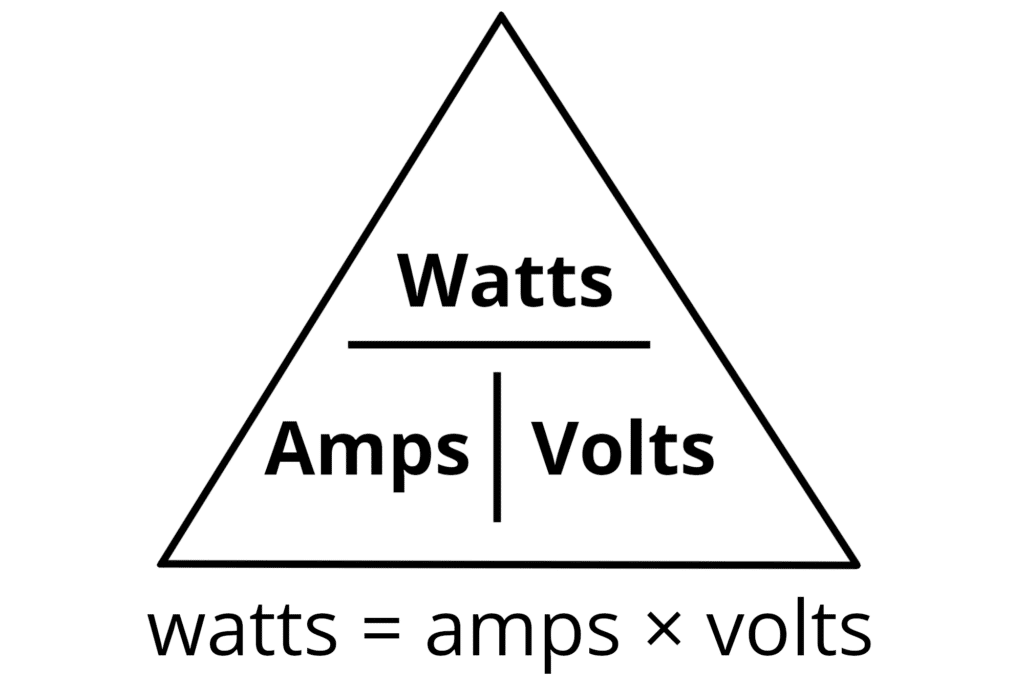
With some appliances, the amperage draw varies depending on how you use it. For example, you may have a flat-screen TV that allows adjustment of the display’s brightness and volume control. These settings will affect the number of amps required to power it.
Additionally, you likely have an appliance that cycles on and off like a refrigerator. This appliance may use more power when starting up, but it will use significantly less electricity when running.
When choosing a generator and powering your RV, you will want to think of watts to start the appliance and run it. Below is a table providing general estimates on appliance starting and running watts.
| Appliance | Starting Watts | Running Watts |
| Air Conditioner | 1000 W – 3500 W | 300 W – 1700 W |
| Refrigerator | 500 W – 600 W | 150 W – 200 W |
| Microwave | 600 W – 1500 W | 600 W- 1500 W |
| Electric Oven | 2800 W – 3000 W | 2800 W – 3000 W |
| Heater | 1200 W | 1200 W |
| Coffee Maker | 500 W – 600 W | 500 W – 600 W |
| Hair Dryer | 900 W – 1500 W | 900 W – 1500 W |
| Laptop | 220 W | 220 W |
| Television | 200 W – 300 W | 200 W – 300 W |
| Fan | 100 W | 40 W |
| Lights LED | 3 W- 30 W | 3 W – 30 W |
| Satellite Receiver | 200 W – 250 W | 200 W – 250 W |
| Electric Grill | 1500 W – 1800 W | 1500 W – 1800 W |
| DVD Player | 300 W | 300 W |
| Washer Dryer | 600 W – 1900 W | 600 W – 1900 W |
| Water Pump | 40 W-60 W | 40 W – 60 W |
Air conditioners and starting watts
Two appliances in many RVs that will have vast differences in starting watts vs. running watts are refrigerators and air conditioners. You’ll be able to hear an audible difference in your refrigerator or air conditioner when they start. What you’re hearing is the compressor kick-on. This high-demand power need will only happen when the appliance starts up or cycles. For example, a standard 12,000BTU air conditioner may efficiently run off 900 watts, but it may require nearly 2,200 watts to start up.
Some inverter generators are just too small to start your air conditioner, even though they’ll be fine for running it once started. For this reason, it’s critical to size your generator for your starting power needs. While this usually isn’t an issue with refrigerators, air conditioners can be. As a result, they are typically the Achilles heel of choosing a properly sized generator.
Fortunately, you don’t need to purchase a huge generator just to get your air conditioner to work. Instead, you can add an accessory to your air conditioner called a hard start kit. This simple, affordable product acts as a mini-capacitor that gives your air conditioner starter an extra boost when powering up. In addition, a hard start kit can reduce your wattage needs to a level that a moderately sized generator can handle.
Choosing the right-sized generator
Now that you have explored the various wattage needs of different electronics and appliances, you may be even more confused about selecting the appropriately sized generator. Luckily, you should note that you won’t be running everything simultaneously under normal conditions. Therefore, you don’t need to budget your generator size to run everything. If you did that, you would purchase an oversized generator for your needs.
For most RVers, your generator needs will fall into several categories. I’ll describe them below:
1,000 Watt inverter generator:
Typically the smallest available generators. They’re also the most portable, efficient, and quietest. A 1,000-watt generator won’t run your air conditioner but is a good option for powering your lights, TV, electronics, and RV essentials like a furnace. For many people, this is enough and provides a super-quiet generator experience.
2,000-2,500 Watt inverter generator
This sized generator seems to be to most common for many RVers. Aside from the air conditioner, it will power almost everything in your RV. They are relatively small, efficient, and quiet. Most people have a problem with this size when they want to power an air conditioner.
In some cases, a 2,500-watt generator will be enough to start up and run a single 13,000 Watt air conditioner, but depending on what else you’re using in the RV, it may fail from time to time. However, this is where a hard start kit comes into play. With a hard start kit, you should be able to start your single AC rather than bump up to the next-sized generator. If you search around online, you’ll see a lot of discussion on powering air conditioners with this sized generator
3,500-4,500 watt inverter generator.
If you don’t want to run into any issues with your air conditioner, bumping up to this size might be your best option. However, you lose in size, efficiency, and noise from what you gain in power. While still significantly better for these concerns than their conventional counterparts, they will be louder, use more fuel, and are heavier than a smaller generator. They’re also significantly more expensive.
6,000+ watt inverter generator
These are your most costly and heaviest options. I’m not sure I would consider them very portable as it will likely take two people to move around. However, if you have two large air conditioning units and want to run them both without power issues, these will do it.
My size recommendation:
I own and use a 2,200-watt Yamaha inverter generator. This wattage is the sweet spot for power, noise, and efficiency. It will run my single 13,000 BTU air conditioner as long as I don’t have a high power demand when starting it. The next size-up Yamaha generator is a 4,500-watt unit, which would give me more than enough power for everything, but it would be overkill 99% of the time. It would also be louder and heavier, two issues I want to avoid.
Fuel type
Most RV inverter generators that you find are gasoline models. However, there is a growing trend to provide dual-fuel models, which use gasoline and propane. Overall, gas models will be more affordable to run, but having a propane option is a nice feature, especially for RVers. You’ll typically pay more for a dual-fuel option. Personally, the increased cost steered me away from this option for my needs. Also, gas is easy to find, especially when camping in a remote location.
My top pick models
Top-of-the-line generators
If you want the most reliable generators available, you can’t go wrong with the two leading brands: Yamaha and Honda. Both companies offer comparable models, with the 2,200-watt lineup being their most popular. These are often considered the quietest and most efficient options available. However, they’re also the most expensive. They both offer a standard 30AMP plug connection, making them perfect for connecting your RV.
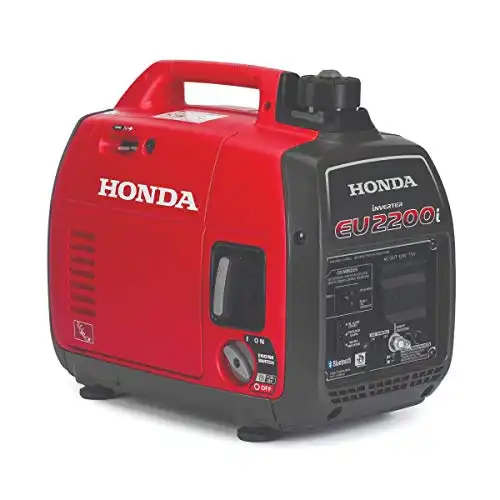 Honda EU2200i 2200 Watt Portable Inverter Generator
Honda EU2200i 2200 Watt Portable Inverter Generator
- MORE POWER. SAME LEGENDARY QUALITY. - The EU2200i delivers 10% more power than the previous EU2000i - enabling you to power more of what you need, in the same lightweight, compact package. The EU2200i gives you the power to get more done.
- CO-MINDER - Advanced Carbon Monoxide Detection System. CO-MINDER continuously monitors carbon monoxide (CO) levels. It automatically shuts down the generator before detected CO levels near the generator become dangerously high.
- HONDA MY GENERATOR APP + BLUETOOTH CAPABILITY - Honda's exclusive My Generator smartphone app offers remote generator operation and monitoring with impressive performance. The app includes wireless start/stop, operation monitoring.
- LIGHTWEIGHT AND COMPACT - Weighing just over 47 pounds, the EU2200i is incredibly lightweight and portable. Thanks to Honda's inverter technology, it's easy to transport and store.
- COMMERCIAL GRADE RELIABILITY - The EU2200i is powered by the Honda GXR120 Commercial Series engine. At 121cc, the GXR120 is at the top of its class - ensuring the EU2200 always produces the power you need to get the job done.
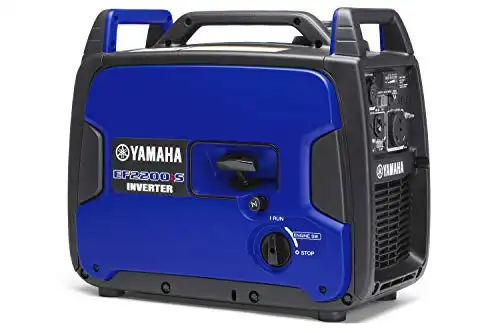 YAMAHA EF2200iS Inverter Generator
YAMAHA EF2200iS Inverter Generator
- Powerful Yamaha 79cc Engine - Provides high power output.
- Yamaha Quiet Technology - Outfitted with Yamaha sophisticated muffler for quiet operation.
- Standard RV Outlet - No more searching for the right adapter. DC Outlet - Flexibility to charge and use devices.
- Illuminated Multi-Function LED Display - See generator status at a glance both day and night.
- Smart Dial Knob - Simple and easy start-up. Smart Throttle - Automatic load sensing adjusts power to device needs.
- Twin Tech Parallel Function - Connect two EF2200iS generators in-line with optional Twin Tech cable for rated 30 AMPS of power.
- Overload Reset Button - Easily restore power without shutting down the unit.
- Fuel Gauge - Easily see fuel level at-a-glance.
- Yamaha Easy Carb Drain - Prevents stale fuel issues and prepares for long term storage.
- Tri-Handle - Makes loading, unloading and moving the unit a breeze. Tool-less Rear Panel - Easily access engine compartment and perform maintenance.
If you want to bump up to the next wattage level, you’ll get 4,500 watts of power. However, you’ll pay for it with your wallet.
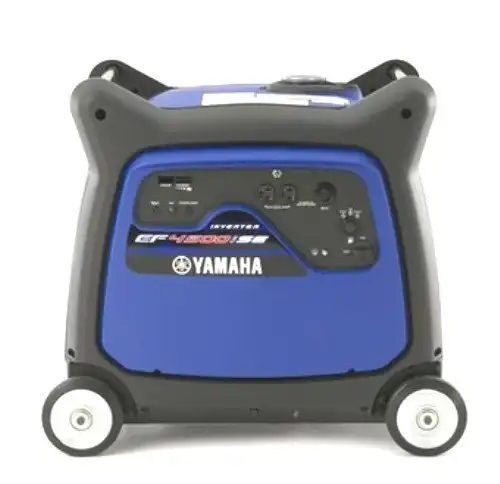 Yamaha EF4500iSE Portable Inverter Generator
Yamaha EF4500iSE Portable Inverter Generator
- The Yamaha EF4500iSE is one of the most technologically advanced inverter generators available.
- Perfect for the RV enthusiast, the EF4500iSE is an ideal source of power for either a fifth-wheel or travel trailer. The Boost Control Unit in the generator automatically senses when you need an additional boost and uses power from the internal 12-volt battery to produce additional amperage.
- 30 amp – 120V Twist-Lock Outlet.
- Overload Indicator – Dual 20A Outlets.
- Maximum AC Output – 4500 Watts
- Automatic Choke – Easy starting even in cold climates.
- 3 Years Limited Warranty
- Low Oil Warning System – Shuts the engine off to protect the engine if the oil level drops.
- Durable Yamaha MZ360 Engine – Designed for long life.
- Power Meter – Easy to read meter indicates the amount of power being used and the amount that’s available.
- Fuel Gauge – Indicates amount of gasoline to indicate refueling interval.
- 50 state legal – EPA & CARB.
Great Value Generators
This generator is quiet, but it also packs a powerful 3800 watts to run all your RV needs. WEN has a solid reputation and is a reliable option for RVers. It also offers a 30A RV plug connection and other features like a digital fuel display and USB port. The best part about this generator is the price. You can find it for about $700, which is less expensive than even the smallest Yamaha and Honda generators.
If you want a small generator for your non-air conditioner needs, you can’t go wrong with the Generac 1,200 unit. This generator is super quiet and efficient and can be found for under $400. It’s a great value. However, you won’t get a 30A plug outlet like the larger models. You’ll need to use dogbone to connect it to your RV. This fact shouldn’t be a problem since you won’t be powering large appliances with it.

